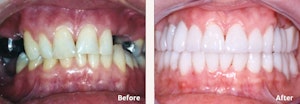If you suffer from chronic pain in your face, head, or neck, you might be surprised to find that the pain may be a problem with your temporomandibular joints (TMJ) of your jaw. This condition is estimated to affect up to 12% of the American population, and it causes a wide range of symptoms that include pain, weakness, and difficulty chewing food.
Full-mouth reconstruction
One of the most effective ways to correct TMJ in Wisconsin is to undergo full-mouth reconstruction. This comprehensive treatment addresses every tooth, the relationship between your teeth and your jaw, and your jaw itself. Full-mouth reconstruction offers a wide range of benefits, including:
- Relief from the pain and discomfort associated with TMJ
- Bright, healthy, and natural-looking teeth
- Results that can last a lifetime
At Grand River Dental in Wisconsin, our father-daughter team of dentists, Dr. Leo Malin and Dr. Rachel Malin, perform minimally invasive full-mouth reconstruction with highly advanced techniques and state-of-the-art equipment. The procedures involve very little pain, and we offer the revolutionary and drug-free NuCalm® deep relaxation system for added comfort and relief from anxiety.












